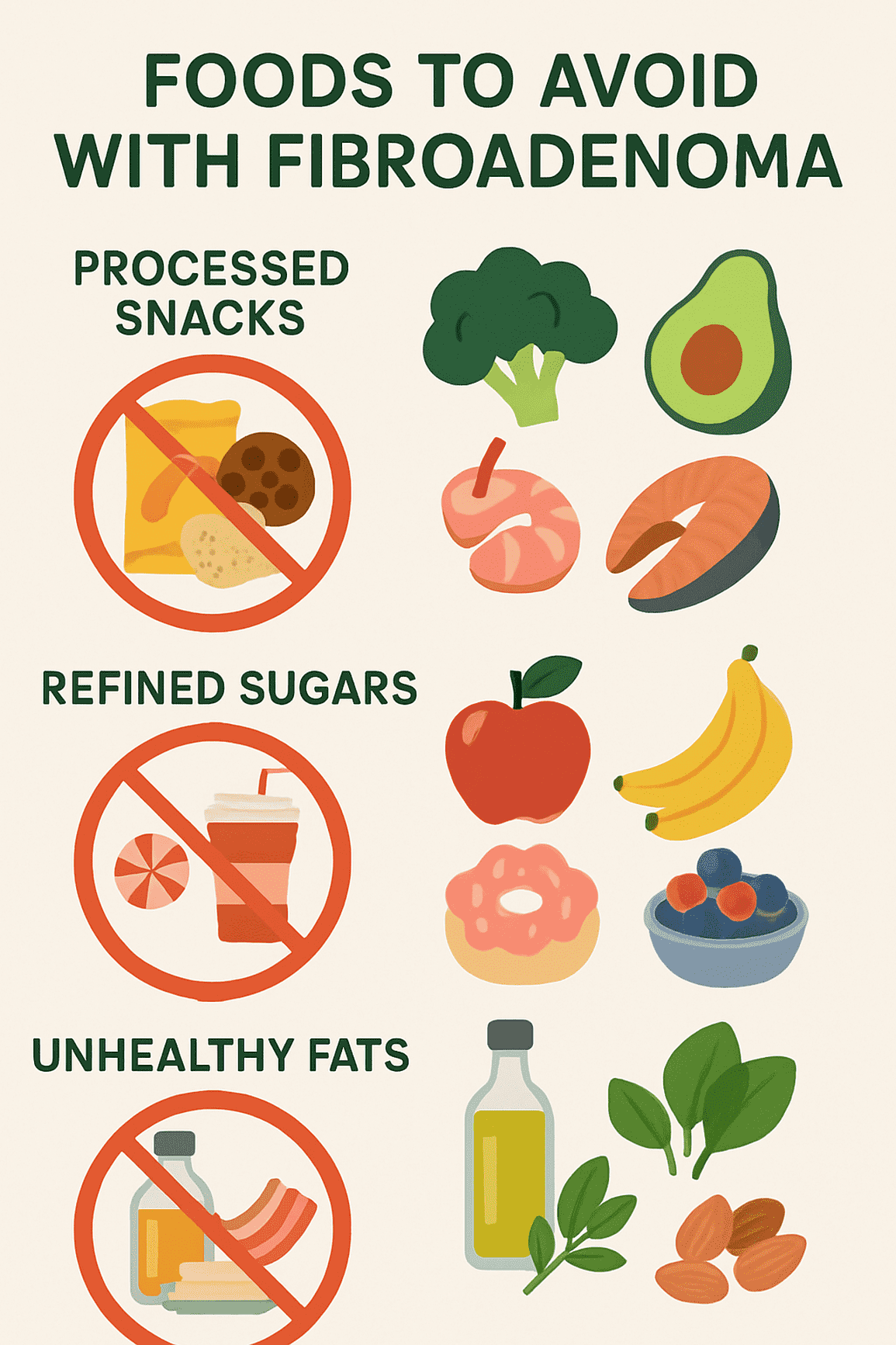
If you’ve been diagnosed with fibroadenoma, you might be wondering, “Can diet reduce the size of fibroadenoma?” While fibroadenomas are benign breast lumps, the right nutrition can support your overall breast health and hormonal balance. This comprehensive fibroadenoma diet guide explores the best foods to eat, what to avoid, and how dietary changes may help manage your condition naturally.
Fibroadenomas are non-cancerous breast lumps that respond to hormonal changes, particularly estrogen. A well-planned diet for fibroadenoma focuses on hormone balance, reducing inflammation, and supporting overall breast health through targeted nutrition.
1. Fatty Fish
Salmon, sardines, mackerel
Rich in omega-3 fatty acids
Reduces inflammation naturally
2. Leafy Greens
Spinach, kale, arugula
High in antioxidants and fiber
Supports hormone detoxification
3. Berries and Citrus Fruits
Blueberries, strawberries, oranges
Packed with vitamin C and antioxidants
Boosts immune system
4. Whole Grains
Quinoa, brown rice, oats
Helps regulate estrogen levels
Supports digestive health
5. Legumes and Beans
Lentils, chickpeas, black beans
High in fiber and plant protein
Aids hormone metabolism
6. Flaxseeds
Rich in lignans (natural phytoestrogens)
May help balance hormone levels
Add to smoothies or yogurt
7. Soy Products (Moderate Amounts)
Tofu, tempeh, edamame
Contains beneficial isoflavones
Choose organic, non-GMO options
8. Cruciferous Vegetables
Broccoli, cauliflower, Brussels sprouts
Support liver detoxification
Help process excess hormones
9. Nuts and Seeds
Walnuts, almonds, chia seeds
Provide healthy fats and vitamin E
Support overall breast health
1. Processed and Packaged Foods
High in preservatives and additives
May contain hormone disruptors
Can increase inflammation
2. Refined Sugars and Sweets
Cause blood sugar spikes
May worsen hormonal imbalances
Increase inflammation
3. Trans Fats and Fried Foods
Promote inflammation
Negatively affect hormone production
Found in fast food and processed snacks
Limit coffee and energy drinks to 1-2 cups daily
Monitor your symptoms – some women notice increased breast tenderness
Choose green tea as a healthier alternative
Stay hydrated with plenty of water
Choose organic dairy when possible
Limit high-fat dairy products
Consider plant-based alternatives like almond or oat milk
Monitor how dairy affects your symptoms
Breakfast:
Oatmeal with berries and ground flaxseeds
Green tea or herbal tea
Lunch:
Quinoa salad with leafy greens and chickpeas
Lemon-olive oil dressing
Dinner:
Grilled salmon with steamed broccoli
Brown rice or sweet potato
Snacks:
Mixed nuts and seeds
Fresh fruit with almond butter
1. Increase Fiber Intake
Aim for 25-35 grams daily
Helps eliminate excess hormones
Supports digestive health
2. Balance Omega Fatty Acids
Increase omega-3s, reduce omega-6s
Anti-inflammatory benefits
Supports hormone balance
3. Maintain Healthy Weight
Excess weight can increase estrogen
Focus on whole, unprocessed foods
Regular physical activity
Always consult your healthcare provider before starting supplements:
Vitamin D: Supports immune function
Vitamin E: Antioxidant properties
Evening Primrose Oil: May help with breast tenderness
Turmeric: Natural anti-inflammatory
Supporting Your Fibroadenoma Management:
Stay hydrated with 8-10 glasses of water daily
Manage stress through meditation or yoga
Get adequate sleep (7-9 hours nightly)
Exercise regularly to support hormone balance
Top Beneficial Foods:
Cruciferous vegetables for detoxification
Fatty fish for omega-3s
Berries for antioxidants
Whole grains for fiber
Nuts and seeds for healthy fats
While diet alone may not shrink fibroadenomas, proper nutrition can:
Support hormonal balance
Reduce inflammation
Improve overall breast health
Potentially prevent growth
Expert Insights
According to Dr. Shailesh Kumar Garge of Citi Vascular Hospital,
"While fibroadenomas are benign, maintaining a healthy diet rich in anti-inflammatory foods and balanced nutrition can support overall breast health and hormonal balance."
When to Seek Medical Advice
Consult your healthcare provider if:
Fibroadenoma changes in size or texture
You experience new breast symptoms
You want to discuss dietary supplements
You need personalized nutrition guidance
A well-planned fibroadenoma diet focusing on anti-inflammatory foods, hormone balance, and overall nutrition can support your breast health journey. Remember, dietary changes work best as part of a comprehensive approach including regular medical monitoring and healthy lifestyle choices.
For personalized guidance on fibroadenoma management and breast health, consult with healthcare professionals. Contact Dr. Shailesh Kumar Garge at Citi Vascular Hospital, K.P.H.B Road No 1, Hyderabad (Phone: 7337583901) for expert medical advice and comprehensive care.
Q1: Which foods reduce hormone levels related to fibroadenoma?
High-fiber foods, cruciferous vegetables, and foods rich in omega-3 fatty acids help balance hormones naturally.
Q2: Are soy and flaxseeds good for fibroadenoma?
Yes, in moderate amounts. Both contain beneficial phytoestrogens that may help balance hormone levels.
Q3: Can processed food worsen fibroadenoma?
Processed foods high in additives and trans fats can increase inflammation and potentially worsen symptoms.
This article is for informational purposes only and does not substitute professional medical advice. Always consult a qualified healthcare provider for diagnosis and treatment.